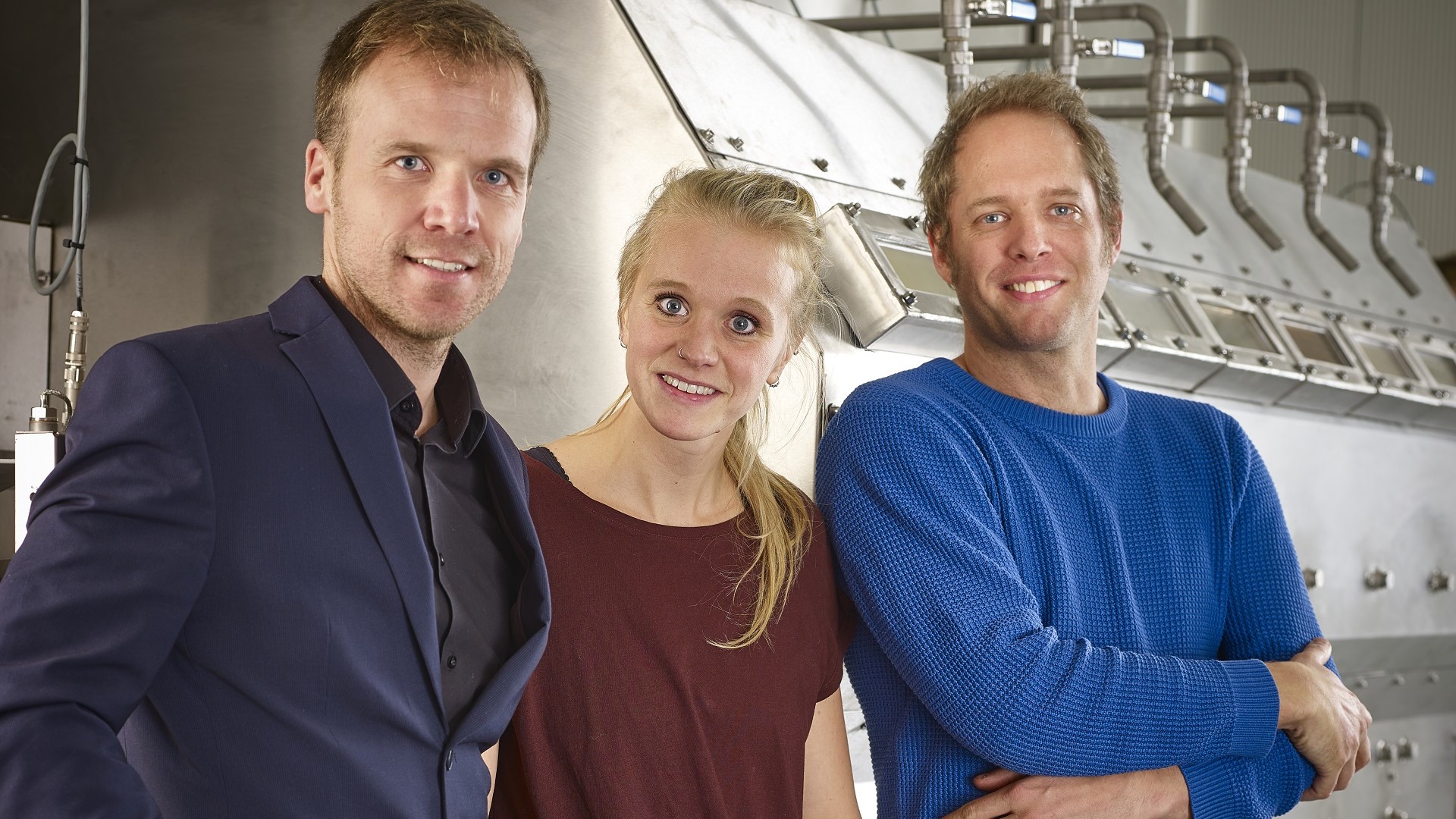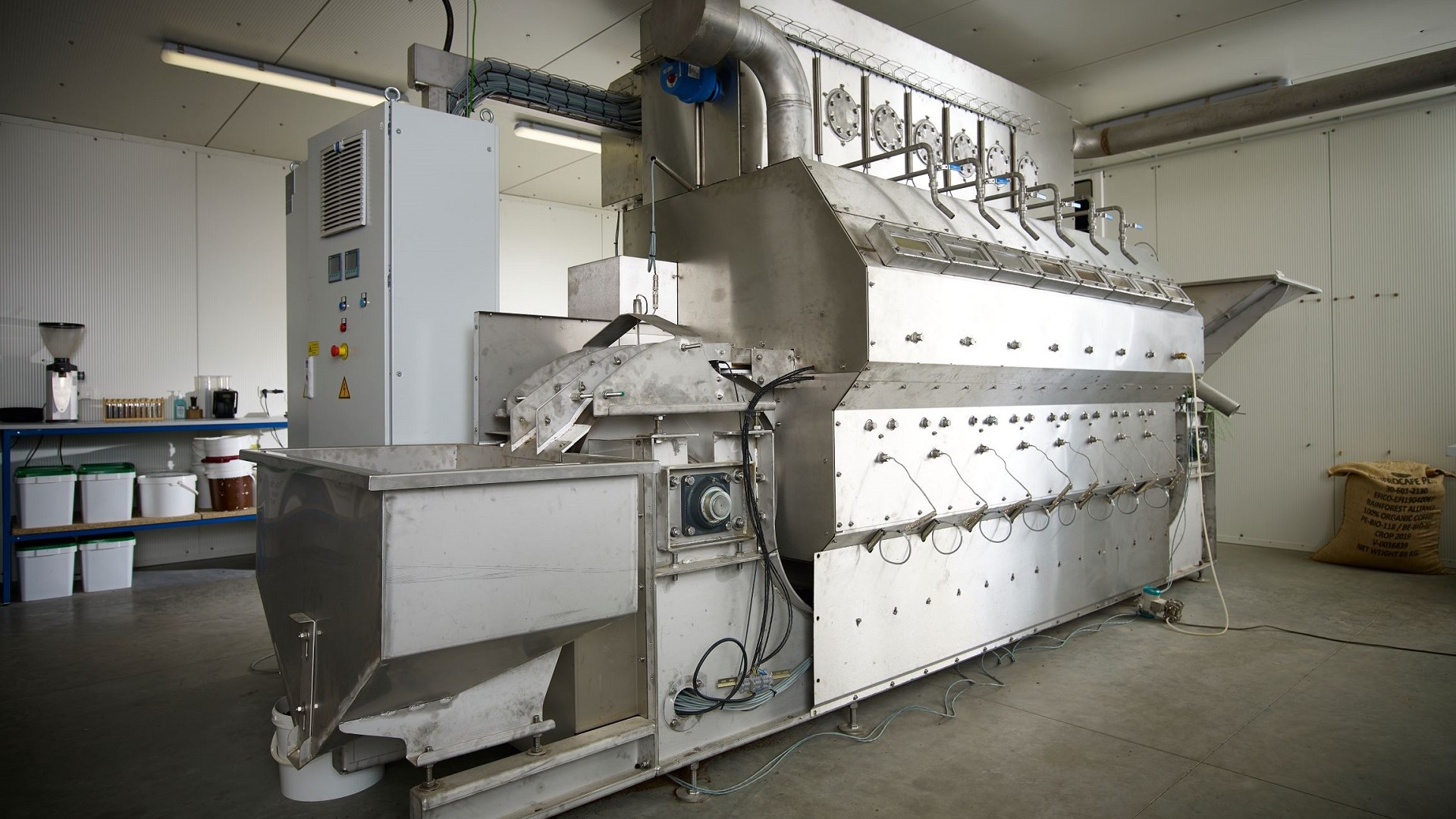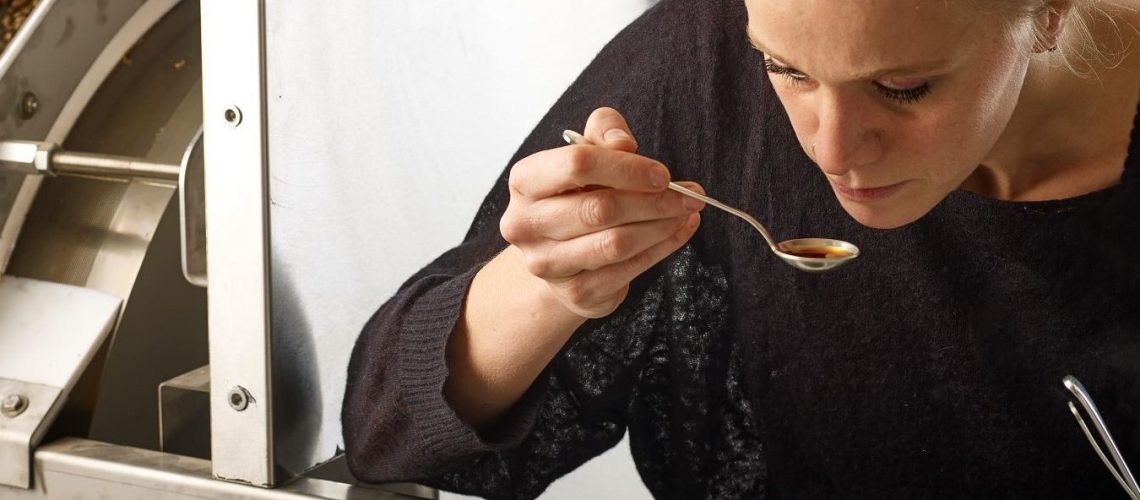We’re dreaming of Carbon Capturing Coffee, coffee that actively removes CO2 from the atmosphere, one cup at a time.
Ray & Jules combines a desire to improve the world with a background in engineering. “The coffee sector produces 60 million tons of CO2 every year. We want to bring that down to zero. It’s ambitious, but doable. Technology like ours can open up new horizons in a sector that has been doing the same thing for over a hundred years. And with all of the associated consequences”, says co-owner Gert Linthout. Introducing a world-first: using solar energy to roast fairtrade coffee.
Sunrays and energy units
‘Ray & Jules’ sounds like a jolly duo. And although the team of five behind this coffee brand are most certainly happy, the name actually refers to sunrays and joule, the international unit that denotes an amount of energy. This is what characterises the people behind Ray & Jules: they’re passionate about making energy-consuming processes more sustainable.

So it’s not because of their passion for coffee? “Of course it is. We do everything we can to let our customers taste the best that coffee has to offer. But this wasn’t the reason to start Ray & Jules”, explains Gert Linthout, the company’s partner and business developer.
The idea behind using solar energy for slow-roasting was the brainwave of initiator Koen Bosmans. With his engineering firm CEE, Koen specialises in making industrial production processes more energy efficient. When he noticed there was little enthusiasm from the large food companies to invest in this kind of roaster, he decided to do it himself.
Sector with impact
“I established that our technology would have the biggest impact if we applied it to the coffee sector. Alongside the cocoa sector – and after meat production – it’s the biggest C02 emitter in the food industry. In addition, there is also a lot to be gained when it comes to fair trade. “, Koen explains.
In 2017, Ray & Jules took the first step in realising their ambitious plan. They took over a coffee roasting company near Leuven. Before he retired, the former owner taught Koen’s wife Sarah and her sister Lieze how to roast speciality coffee using artisanal techniques. Meanwhile, Koen threw himself into the technological side of the business. He decided to ‘reinvent’ the coffee roaster. This would generate more energy than making the old technology more energy efficient.
There were definitely teething problems. The development of the roaster continually ran up against obstacles. “An ‘inventor’ like Koen might see these as just challenges, but it did also mean three years with barely any income”, Gert recalls. The team’s limited experience in coffee roasting is also a challenge. “As is the fact that we have big ambitions for our small organisation: to make the entire coffee chain petrol-free and fair by 2050. We’re even dreaming of Carbon Capturing Coffee, coffee that actively removes CO2 from the atmosphere, one cup at a time.”
Reinventing the coffee roaster
Koen Bosmans: “Experienced coffee roasters claimed it was impossible to roast coffee using solar energy. Because the process requires so much energy. Well, we love rising to this kind of challenge… Especially when we can apply our engineering brains to the problem. Until we can prove it’s not possible, we keep trying. And guess what? By taking a different approach to the roasting process – and in a way that actually produces tastier coffee – powering our roaster from the solar panels on our roof has been a resounding success.”

So what sets the roasting process used by Ray & Jules apart from the classic approach? Ray & Jules’ patented machine looks nothing like an industrial drum roaster which roasts the beans quickly at a high temperature. Because the hot air is used just once, an incredible amount of energy is lost. In the coffee roaster that Koen Bosmans came up with for Ray & Jules, the same hot air circulates continuously while the beans roast slowly.
“Because our roaster only requires a third of the energy of a classic roaster, it’s perfectly possible for it to be powered by solar panels. Zero C02 emissions”, says Gert Linthout. And that’s before we get onto how much better it tastes.
“The secret of the best-tasting coffee is that the beans are roasted slowly at a low temperature. This is the only way to let the 800 possible flavours and aromas develop. Industrial coffee is often samey because industrial roasting means that it all has a bitter, charcoal-like taste. To be able to produce as much coffee as possible, they roast that coffee twice as fast as what is actually ideal. The consumer is in fact buying burnt beans. Thanks to the big producers, we’ve become accustomed to that taste.”
Artisanal coffee on an industrial scale
“15 million tons of CO2 emissions each year. There is so much to be gained for the planet if we can make coffee roasting carbon neutral. Up to 60 million tons if you make the entire production process sustainable. We are proving that it is technologically possible. So we see it as our duty to go all out on actually making it happen. In 30 years time, my daughter will be the same age as I am now. If she asks me then what I have done to save our planet from destruction, I don’t want to be left tongue-tied”, says Gert.
Perfectly roasted coffee of artisanal quality, no CO2 in the atmosphere, ambitions to do even better….sounds good! But with a roasting process that takes twice as long, can you actually roast coffee in an economically viable way? “Yes. Our installation is built with industrial scalability in mind from the outset: it’s technology that runs 24/7 and that you can control and monitor remotely. Our ultimate goal is to have the whole coffee sector running on renewable energy. This is why we’re not specifically focusing on “environmentalists” or real coffee connoisseurs, but we want to appeal to anyone who loves coffee. CO2-free coffee must become the norm. The coffee drinker has the power to change the sector; we have the technology”, says Koen Bosmans with conviction.
Ray & Jules are currently focusing their efforts on boosting sales. Gert Linthout: “To have more impact on the sector, we need to expand. We want to grow our impact, not necessarily our roasting facility. We see Ray & Jules evolving into a network of small-scale roasters, with local teams all over Europe. We take a critical view of the classic scale-up model – whatever happens, we want to avoid this leading to a downward spiral for both the people and the product.”

As a small business, Ray & Jules can react quickly to any challenges that might come along. The corona lockdown, just a few months after an extensive brand launch, immediately required them to draw on all the flexibility they had. “We were mainly supplying companies. But when homeworking became the norm, we had to start targeting consumer sales much earlier than planned. Fortunately, they embraced us with open arms. It was a real boost for our company. We adjusted our installation to be able to package the coffee in smaller packets, we were able to recruit someone with a strong background in the coffee market…”, says Gert gratefully.
100 % CO2-neutral coffee
The ambitions extend far beyond Europe. To make the entire coffee production process CO2 neutral, other steps need looking at from a sustainability perspective. Ray & Jules therefore want to go to the countries where the coffee is grown. They are currently setting up pilot projects with farmers’ organisations that use regenerative farming practices and sustainable technology to wash and dry the coffee.
Gert Linthout: “Long term, we also want to roast coffee in the countries where it’s grown. The fact that our technology is solar powered, and has been developed in such a way that you don’t need a qualified roaster to constantly keep an eye on things, will make this easier.”
By 2030 Ray & Jules wants to be able to supply the first 100% CO2-neutral coffee. They are currently busy building a network of companies and organisations that can help with that. “We tackle every aspect that can be improved. Of course, we can’t do everything ourselves, but we consider it our responsibility to at least trigger others into action.”
A fair portion for the producing countries
Another important reason to bring the production process to the countries where the coffee is grown is that it offers the people there economic opportunities. “Currently only 10% of what the consumer pays ends up in the countries where the coffee is grown. That’s not right. That’s why we’re also committed to 100% fairtrade coffee. By the end of 2020 all of our coffee will be fairtrade-certified. And a large part of it organic, too”, explains Koen Bosmans.

Ray & Jules buys most of the unroasted fairtrade coffee via experienced intermediaries like Oxfam Fair Trade, Efico and 32cup. “We are still too small to work directly with the farmers organisations ourselves”, says Gert. They hope to do this within a few years because you need more than a certification, they find. “In a lot of cases, the fairtrade minimum price isn’t enough to provide the farmers with a living wage. In addition, this system lacks the incentives for farmers to produce truly top-quality coffee.”
And this is without doubt what Ray & Jules want to produce. For as many people as possible. Gert: “It is only with quality coffee that we will change the sector. To have an impact, we have to sell. And nobody pays a fair price for coffee that doesn’t taste good. Our vision: if you don’t drink delicious coffee, don’t drink it at all. That’s even more sustainable!”


